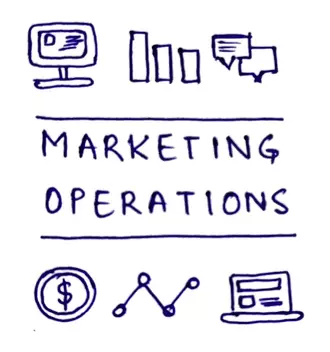Marketing Operations
Definition
Marketing operations can be defined as optimising, streamlining, and managing an organisation’s various marketing activities and processes to improve efficiency, effectiveness, and alignment with business goals.
Description
Businesses can leverage technology, data, and analytics to optimise marketing strategies and tactics to increase efficiency and improve marketing effectiveness.

Marketing operations typically involve budget management, project management, campaign planning and execution, data analysis, performance measurement, and reporting. It also includes developing and maintaining marketing technology systems, such as customer relationship management (CRM) platforms, marketing automation software, and analytics tools.
Marketing operations aim to ensure that marketing efforts are aligned with overall business objectives, and to help marketing teams achieve their goals cost-effectively and efficiently. By leveraging data and technology, marketing operations can help organisations improve their targeting, segmentation, and personalization efforts, ultimately driving better results and ROI from their marketing initiatives.
Importance of Marketing Operations
Marketing operations are crucial for organisations that want to maximise the impact and ROI of their marketing efforts. Here are some reasons why marketing operations is important:
- Efficiency: Marketing operations helps improve the efficiency of marketing processes by streamlining workflows, automating repetitive tasks, and reducing manual efforts. This enables marketing teams to focus on higher-value activities such as strategy development and creative execution.
- Alignment: Marketing operations helps ensure marketing efforts align with overall business goals and objectives. By providing a framework for planning and execution, marketing operations helps teams stay focused on the most important initiatives and ensures that resources are allocated appropriately.
- Data-driven decision making: Marketing operations leverages data and analytics to inform decision making, enabling teams to make informed choices based on real-time data and insights. This helps teams optimise their campaigns, improve targeting and segmentation, and measure the effectiveness of their efforts.
- Consistency: Marketing operations helps ensure consistency across all marketing channels and initiatives, ensuring that messaging, branding, and creative are consistent across all touchpoints. This helps build brand equity and fosters a cohesive customer experience.
- Scalability: Marketing operations helps organisations scale their marketing efforts as they grow, enabling them to expand their reach and target new audiences while maintaining the same level of efficiency and effectiveness.
How to Make a Marketing Operations Strategy?
Developing a marketing operations strategy involves a series of steps that help to ensure that your marketing efforts are aligned with overall business objectives, and that you have a clear roadmap for achieving your goals. Here are some steps to consider when developing a marketing operations strategy:
- Define your goals and objectives: Before developing a marketing operations strategy, it’s important to define
your goals and objectives. What do you want to achieve with your marketing efforts? Are you looking to increase brand awareness, drive lead generation, or improve customer retention? Understanding your goals and objectives will help to guide your strategy and ensure that your efforts are aligned with business objectives. - Assess your current marketing operations: Once you have defined your goals and objectives, you must assess your current marketing operations. This involves evaluating your existing marketing processes, systems, and tools to identify areas of improvement. This step is critical to understanding where you stand and where you need to go.
- Identify key areas for improvement: Based on your assessment, identify the key areas for improvement. This could include streamlining workflows, improving data management, increasing automation, enhancing reporting and analysis capabilities, or other areas needing improvement.
- Develop a roadmap: Develop a roadmap that outlines the steps you need to take to achieve your goals and improve your marketing operations. This roadmap should include specific actions, timelines, and responsibilities.
- Implement changes: Once you have developed your roadmap, it’s time to implement the necessary changes. This may involve investing in new marketing technology, developing new processes, or training your team on new systems and workflows.
- Measure and optimise: After implementing changes, it’s important to measure the effectiveness of your marketing operations strategy and optimise as necessary. This involves monitoring key performance indicators (KPIs) and using data and analytics to continuously improve your marketing efforts.
Future Strategies of Marketing Operations
Marketing operations are constantly evolving as new technologies, trends, and customer behaviours emerge. Here are some future strategies that may shape the direction of marketing operations:
- Personalization: As customers increasingly expect personalised experiences, marketing operations must prioritise personalization strategies. This could include leveraging data and analytics to better understand customer preferences and behaviour, and using technology to deliver customised experiences across all touchpoints.
- Artificial intelligence (AI) and machine learning: As AI and machine learning continue to advance, marketing operations will increasingly rely on these technologies to automate tasks, analyse data, and optimise campaigns. This could include using AI-powered chatbots for customer service, or leveraging machine learning algorithms to improve targeting and segmentation efforts.
- Data privacy and security: With growing concerns around data privacy and security, marketing operations must prioritize strategies that protect customer data and ensure compliance with regulations like GDPR and CCPA. This could include implementing data encryption, conducting regular audits, and ensuring all third-party vendors comply with relevant regulations.
- Omnichannel marketing: As customers increasingly interact with brands across multiple channels and devices, marketing operations must prioritize strategies that enable seamless omnichannel experiences. This could include developing integrated marketing campaigns that leverage multiple channels, or investing in technologies that enable real-time personalization across all touchpoints.
- Agile marketing: As the pace of business continues to accelerate, marketing operations will need to adopt agile methodologies that enable faster, more iterative campaign development and execution. This could include using agile project management tools, developing cross-functional teams, and adopting a test-and-learn approach to marketing.
Example:
Zomato, a food delivery and restaurant discovery platform follows this marketing operations strategy:
- Data-driven decision making: Zomato uses data and analytics to inform its marketing strategies, allowing the company to make informed decisions based on real-time insights. For example, the company leverages customer data to personalise its marketing campaigns and improve targeting and segmentation efforts.
- Focus on customer experience: Zomato prioritises the customer experience across all touchpoints, from the app and website to customer service interactions. The company uses customer feedback to continuously improve its products and services, and invests in technologies that enable seamless customer experiences.
- Integration of marketing channels: Zomato uses an integrated marketing approach, leveraging multiple channels such as email, social media, and SMS to engage with customers and drive conversions. The company also invests in content marketing, using blog posts, videos, and other content formats to educate and engage customers.
- Emphasis on innovation: Zomato prioritises innovation in its marketing operations, investing in new technologies and strategies to stay ahead of the curve. For example, the company has experimented with augmented reality features in its app, allowing customers to see restaurant menus in 3D.
- Localization: Zomato has customised its marketing strategies for the Indian market, recognizing the importance of localization in driving engagement and conversions. For example, the company has launched region-specific marketing campaigns highlighting local cuisine and cultural events.
FAQs
What are marketing operations?
Marketing operations refers to the processes and strategies that support the planning, execution, and measurement of marketing campaigns and initiatives.
What are the key components of marketing operations?
The critical components of marketing operations include strategy development, campaign planning and execution, project management, budgeting and financial management, data management and analytics, and technology and infrastructure management.
What are the benefits of marketing operations?
Marketing operations can help organisations streamline their marketing processes, improve collaboration and communication between marketing teams and other departments, ensure consistency and quality across marketing campaigns, and optimise marketing performance through data-driven decision-making.
What technologies are used in marketing operations?
Technologies used in marketing operations can include marketing automation platforms, customer relationship management (CRM) systems, project management tools, data analytics platforms, and content management systems (CMS).
How can marketing operations improve customer experiences?
Marketing operations can improve customer experiences by ensuring that marketing campaigns and initiatives are aligned with customer needs and preferences, delivering personalised experiences across all touchpoints, and optimising customer journeys through data-driven insights and optimizations.
What skills are required for a career in marketing operations?
Skills required for a career in marketing operations can include project management, data analysis, technology management, financial management, communication and collaboration, and strategic thinking.
What is the future of marketing operations?
The future of marketing operations will likely be shaped by emerging technologies such as artificial intelligence and machine learning, a focus on personalization and customer experience, data privacy and security, omnichannel marketing, and agile methodologies.





We would love to have your opinion.